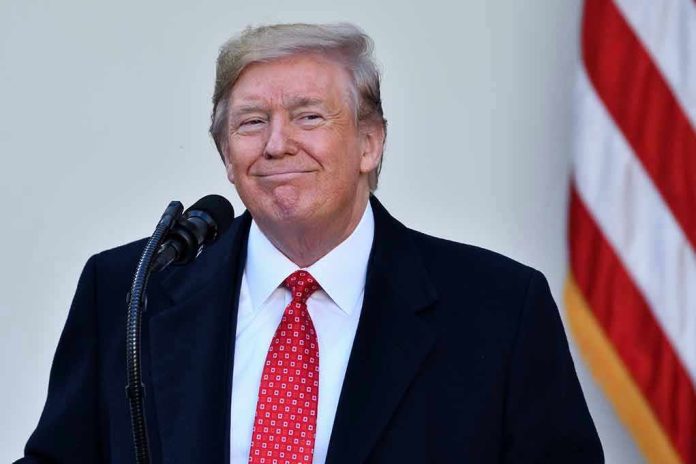
If a president’s name crowned a billion-dollar NFL stadium in the heart of the nation’s capital, would it forever change how America commemorates its leaders—or simply spark the biggest branding brawl in Washington history?
Story Snapshot
- The White House publicly called the idea of naming the new Washington Commanders stadium after Donald Trump “beautiful.”
- Trump’s direct involvement in the stadium deal puts his legacy at the center of a high-profile public project.
- The decision requires approval from both the D.C. Council and National Park Service, making it a political flashpoint.
- Stadium naming rights for a living political figure would break decades of commercial precedent in American sports.
Trump’s Name in Lights: Political Legacy Meets NFL Branding
Donald Trump’s push to have his name atop the new Washington Commanders stadium catapults the intersection of sports, politics, and personal branding into the national spotlight. The $4 billion project on the former RFK Stadium site is more than a homecoming for the Commanders—it’s a litmus test for how far legacy branding can go in American public life. The White House’s enthusiastic “beautiful” endorsement is unprecedented, transforming a routine sports development into a referendum on presidential commemoration and partisan identity.
The Commanders’ ownership group, the NFL’s Roger Goodell, and local officials now face a dilemma: embrace Trump’s legacy and risk polarizing the fan base, or maintain tradition and keep naming rights in the corporate domain. While corporations have dominated stadium naming for decades, Trump’s historic role in brokering the stadium deal—and the White House’s crediting him as the project’s catalyst—sets the stage for a contentious debate that goes far beyond football.
High Stakes: Who Decides, Who Gains, Who Loses
Final approval for any stadium naming rests with the D.C. Council and National Park Service, both keenly aware of the political and cultural ramifications. The Commanders, newly returned to D.C. after decades in Maryland, are navigating a minefield of financial, branding, and community interests. D.C. Mayor Muriel Bowser’s office has declined comment, signaling the sensitivity of the issue, while the Commanders themselves remain officially noncommittal. The power dynamics are clear: Trump’s influence may be considerable, but legal and political roadblocks remain formidable.
For fans and local residents, the proposal is likely to spark fierce debate. Some may see Trump’s name as a fitting tribute to the man credited with making the stadium possible. Others will argue that public venues—especially those of such historical significance—should remain above the fray of political branding, echoing conservative values of tradition and community stewardship. The fact that the stadium sits on federally managed land adds another layer of complexity, forcing stakeholders to weigh public interest against political reward.
Breaking Precedent: Commercial Norms versus Political Honors
Industry experts note that selling stadium naming rights to corporations has been a bedrock revenue source for American sports teams. Naming a major venue after a living politician would not only disrupt this model—it would set a precedent that could ripple through the sports industry for years. Political scientists warn that such a move risks politicizing public spaces and erasing local history, while branding experts highlight the reputational risks for both the team and the city. The debate touches on core conservative principles: respect for history, proper stewardship of public assets, and cautious optimism about change.
Supporters of the Trump naming argue that extraordinary contributions warrant extraordinary recognition, especially when the president’s actions directly enabled the stadium’s construction. Critics counter that this approach undermines democratic norms and commercial best practices, inviting future leaders to seek similar honors for political gain. The outcome could either reinforce the tradition of corporate sponsorship or forever alter the landscape of public commemoration in American sports.
Uncertain Future: Open Questions and Lasting Impacts
With the stadium’s scheduled opening in 2030 and naming rights still undecided, the story remains unresolved. The White House’s public support, captured in headlines and newscasts nationwide, has intensified scrutiny and speculation. The Commanders, D.C. Council, and National Park Service will ultimately decide whether Trump’s name becomes synonymous with the city’s most prominent sports venue. For now, the open loop persists: will Washington embrace the “beautiful” vision put forth by the White House, or will tradition and caution win out?
As the debate continues, the implications extend well beyond the stadium walls. The outcome will shape not only the Commanders’ brand and the city’s identity but also the future of political legacy in American public spaces. Whether the stadium bears Trump’s name or not, this episode will set a lasting precedent for how America chooses to honor—and brand—its leaders.



